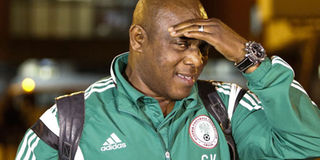At US ’94, Stephen Keshi inspired many African stars

Nigerian national football team coach Stephen Keshi is seen upon his arrival to Guarulhos International Airport in Sao Paulo, Brazil on June 10, 2014, two days before the start of the Fifa World Cup Brazil 2014. PHOTO | MIGUEL SCHINCARIOL |
What you need to know:
- The image of goal bomber Rashidi Yekini clutching onto the net after netting the first goal will forever remain etched on the minds those who watched the match.
- Keshi is hailed as the guy who opened the gates for many African footballers to join the paid ranks in Europe.
Never before has a team so captured the imagination of Kenyans than the 1994 “Golden Generation” of the Super Eagles, Nigeria’s national football team.
Barely three months after winning that year’s edition of the Africa Cup of Nations after beating a resurgent Zambia 2-1 in the final in Tunis, this generation of hugely gifted stars set off to the USA to make their maiden appearance at the Copa Mundial.
Hitherto unknown outside the continent, the team took the world by storm, trouncing Bulgaria, led by the great Hristo Stoichkov and Yordan Letchkov a resounding 3-0. The image of goal bomber Rashidi Yekini clutching onto the net after netting the first goal will forever remain etched on the minds those who watched the match.
The next casualty was Greece, which the Nigerians easily dispatched home with a 2-0 victory. Despite losing to the Diego Maradona-captained Argentina 1-2 in the third match, the Super Eagles advanced to the next stage to meet one of the tournament’s favourites Italy and were a minute away from snatching victory when one ponny-tailed Roberto Baggio struck, forcing the game into extra time.
The unimaginable happened in the 102nd minute when the crafty Italians were awarded a penalty, duly converted by the same Baggio, eliminating the team many agree had the quality to go all the way.
At the helm of this team was one Stephen Okechukwu Chinedu Keshi, then 32. Known variously as the “big boss” or the “gentle giant”, thanks to his imposing frame, Keshi - alongside Augustine Eguavoen, Uche Okechukwu, Chidi Nwanu and Uchenna Okafor - formed a solid wall in front of goalkeeper Peter Rufai.
He may have featured only in the second match against Greece but his leadership skills were all too evident, rising up every now and then to issue instructions from the bench. Such was the high esteem the “big boss” was regarded by his Dutch coaching duo of Clemens Westerhof and Jo Bonfrere.
Keshi, who passed on early Wednesday morning of cardiac arrest in Benin City in Nigeria, would go on to make many firsts. In 2006, Keshi guided unfancied Togo to the World Cup, becoming the first black African to qualify a team to the Copa Mundial.
In 2011, Keshi took over the then struggling Super eagles and in two years’ time, he guided the team to win the Afcon in South Africa, becoming only the second African to win the cup both as a player and a coach, a feat previously achieved by Egyptian Mahmoud el Gohary.
Unknown to many, Keshi is hailed as the guy who opened the gates for many African footballers to join the paid ranks in Europe. A story is told of how one hugely-talented Ghanaian youngster called Nii Lamptey Odartey made it to Europe: “As soon as Lamptey had a little money - a bonus after playing in the Under-16 World Cup in Scotland in 1989 - he fled his homeland, and told no one, not even his parents, until he was in Belgium. Ghana’s FA wanted him to stay in order to build a team around him. They confiscated his passport,” reported the respected Guardian newspaper in 2008.
“So Lamptey hid in the back of a taxi and illegally crossed three borders (Ghana-Togo, Togo-Benin, Benin-Nigeria) to reach Lagos, where he met the agent of Nigeria’s captain, Keshi, who was then playing in Belgium for Anderlecht. He was one of the few people Lamptey trusted,’ the story goes.
“Keshi had never met him, but knew of his reputation and had spoken to him by phone. ‘When the agent phoned to tell him I was in Lagos, I heard Keshi shout with joy,’ says Lamptey, who was then 14 years old.
He waited in Lagos for Keshi to fetch him, then flew to Belgium on a fake Nigerian passport - which he discarded as soon as he got there - posing as Keshi’s son (such was the player’s influence). Nobody at Anderlecht really believed it was Lamptey, so they tested him at training with older boys.
‘Everyone was there, even the club president,’ he says. ‘After the first two or three touches they knew I was the real Lamptey.”
I had occasion to bump into Keshi at the Hotel La Mada on the morning of June 5, 2013. The “big boss” was in town to execute the Super Eagles – Harambee Stars 2014 World Cup qualifier.
A man of few words, Keshi simply told me: “We respect Harambee Stars immensely but we have not travelled across oceans for a holiday, we are here to win.” Super Eagles did win. Rest in Peace “big boss.”




